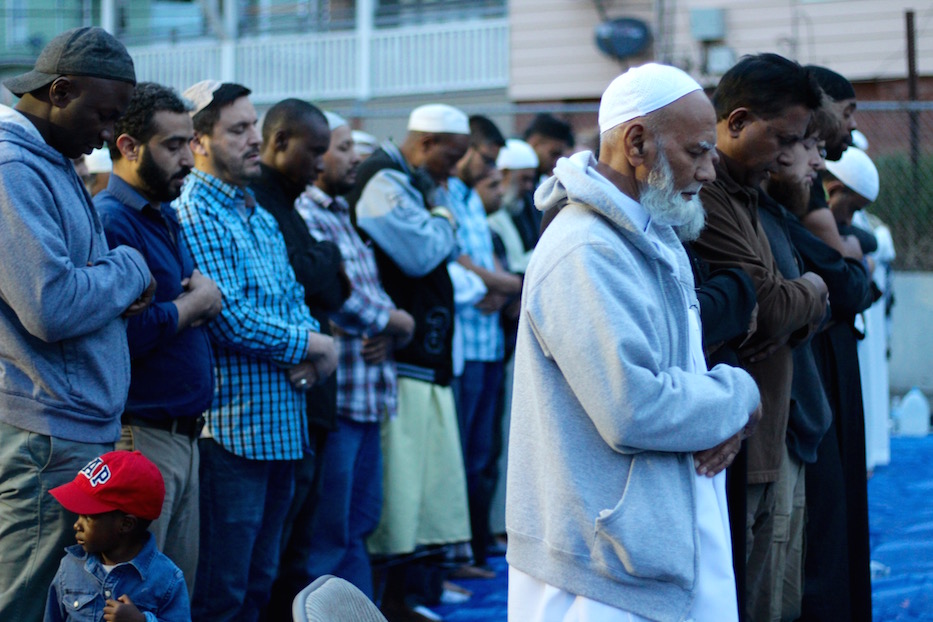
Culture & Community | Faith & Spirituality | Waterbury | Ramadan
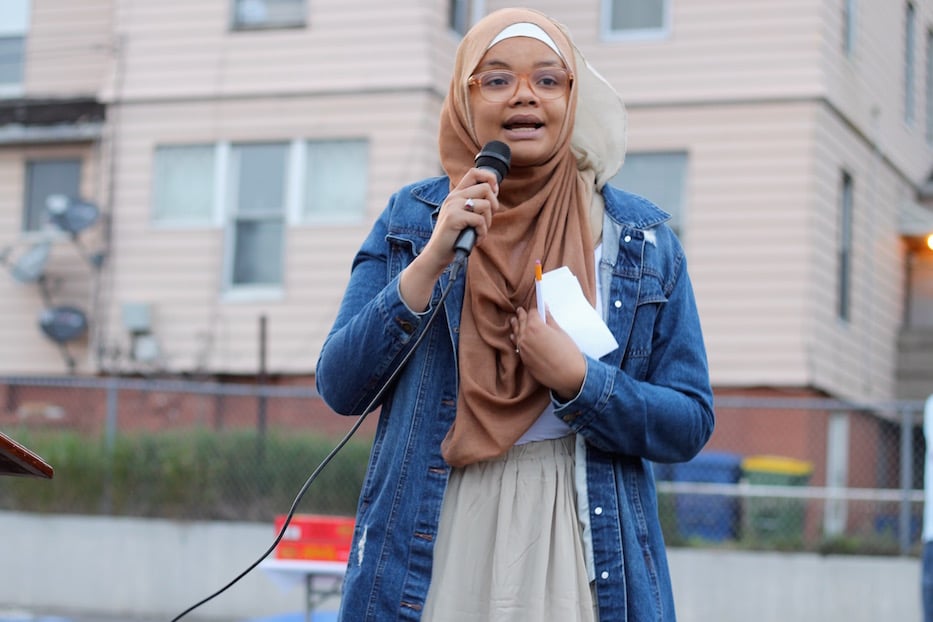
| Alicia Hernandez Strong, who began her conversion to Islam her senior year of high school. "These conversations are so essential, especially now," she said. Lucy Gellman Photos. |
When Alicia Strong walks into her father’s house, she knows that he’ll greet her with As-salamu alaykum and halal meat ready to eat in the kitchen. She knows it took him a long time to get to that place, because of his own Roman Catholic faith. And she believes that through discussion and discomfort, other non-Muslim Americans can get there too.
Saturday night, Strong brought that message to Waterbury’s second annual “Sharing Ramadan,” an interfaith iftar held at the United Muslim Masjid of Waterbury. As Muslim faith leaders, community organizers and congregants waited to break their daily Ramadan fast with dates, soup, and a warm meal, they gathered to explain the holy month to members of the greater Waterbury community, who then stayed for a communal meal.
Celebrated during the ninth month of the Muslim calendar—which is lunar, meaning the dates shift—Ramadan marks the Prophet Muhammad’s first receipt of a verse from the Quran thousands of years ago. After eating a meal before dawn (suhūr), Muslims abstain from food and water until sundown, in an effort to identify with the hungry, poor, sick and suffering in their midst. This year the holy month runs from May 5 through June 4, ending with Eid al-Fitr.
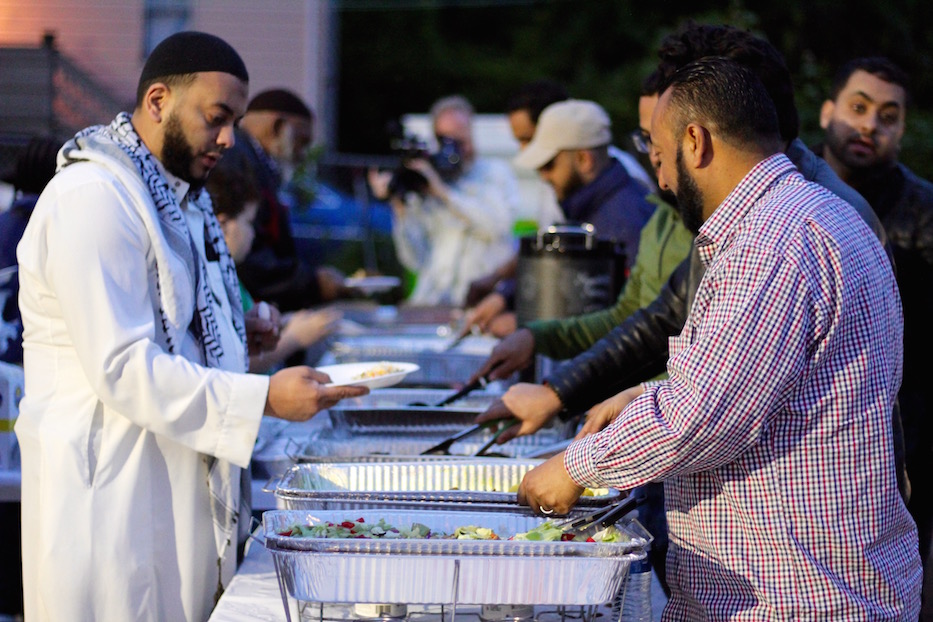
| Fahd Syed (pictured at left): “How can we defeat hate?" |
“How can we defeat hate? This is something that [we can do to] defeat hate, coming together like this,” said Fahd Syed, a member of the Muslim Coalition of Connecticut (MCCC) who organized the event with a number of faith leaders in the region. “Whether it’s coming to share Ramadan, coming to your places, going to rallies … we have to look out for our brothers and sisters.”
Speaking to a growing crowd outside the masjid, faith leaders echoed those words. Ashraf Ibrahim, imam at the Waterbury Islamic Cultural Center, said that this year’s Ramadan has been a month of great peace and inner reflection, punctured by great pain and global suffering.
He lamented attacks on Muslims in Christchurch, New Zealand and more recently Diyanet Mosque in New Haven, extending his thoughts to Christian victims of an Easter Sunday church bombing in Sri Lanka. For those in the Islamic community, he said, suffering to any faith means suffering to all faiths, because people are bound by the fact of their humanity.
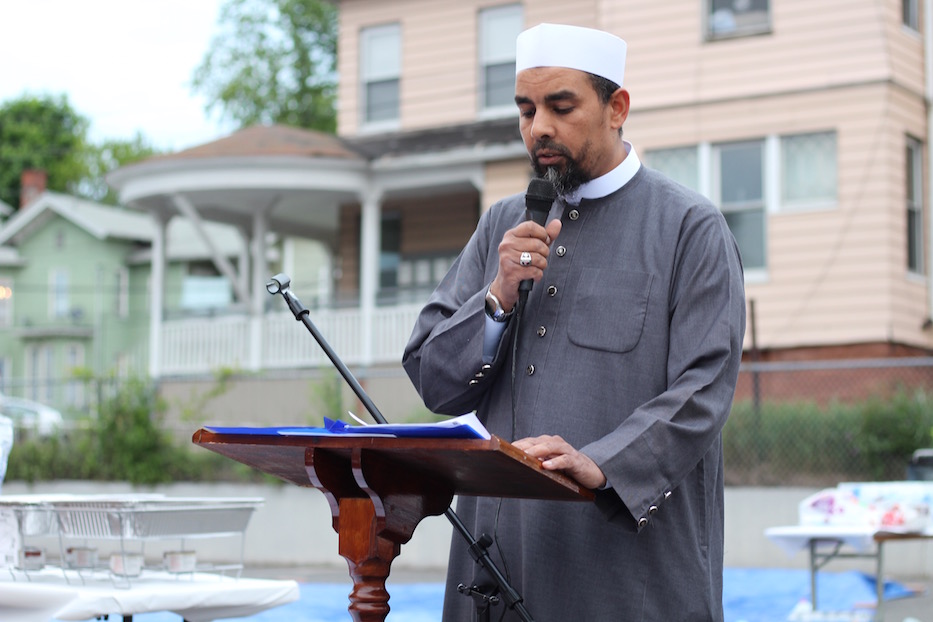
| Ashraf Ibrahim: We are one community. |
“No matter and regardless of our background or faith, we are one community,” he said. “[We] live in the same community, live in the same society, live in the same country. Maybe different colors, like flowers, roses. Maybe different varieties of fruit, but live in the same garden. We are here today to celebrate the month of Ramadan, and to show our unity and our brotherhood as one community living in the United States.”
One of the last to speak before the iftar, Strong told attendees about the role Islam has played in her own life—and the role she hopes it will play in defeating Islamophobia. Now 22 years old, Strong was born and baptized in the Roman Catholic church, and raised in New Britain.
At just six years old—on Sept. 11, 2001—she recalled watching the World Trade Center’s towers fall “over and over and over again” on the news, and hearing anti-Muslim rhetoric on the television and in school and pop culture. For years, she followed that narrative.
“I internalized it, I believed it,” she recalled. “Because that’s all that was taught to me.”
Until her junior year at New Britain High School, when a world history teacher urged her to rethink everything she knew. For the first time in 15 years, she learned that Muslims prayed five times a day. She learned that Islam was a religion that both praised and exhorted peace. She learned that Islam had very little to do with depictions she saw in the mainstream media, and instead had “a commitment and a strive to justice that I’d never seen before.”
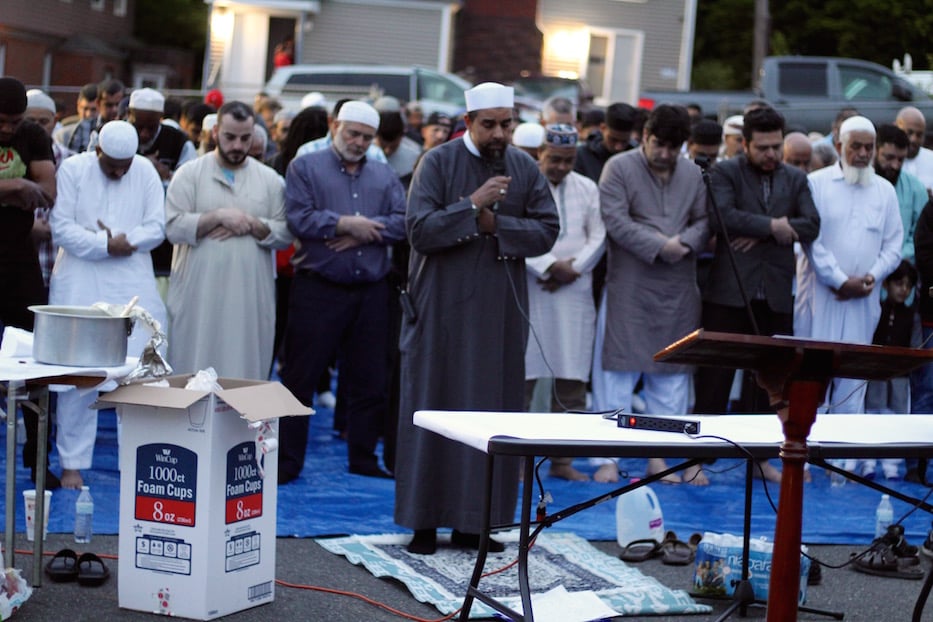
The next year, she began her own conversion to Islam. It was “a hard and very long journey” that started with her family, she recalled Saturday. Her parents tried to square the daughter they knew and loved with the faith they had only seen depicted through their television sets and in the newspaper. But then they listened.
Strong told them that she was moved by Islam’s commitment to social justice. She told them she did not see a religion that oppressed women, but one where she could draw inspiration from The Prophet's first wife Khadija, a businesswoman who was 15 years his senior and not ashamed of her age. That she was moved by the Muslim women who had started universities and voiced their commitment to education. That she saw in the faith a chance for her own liberation, as both a woman and an Afro-Latina.
“Over time, the dialogue—talking and talking and having uncomfortable conversations—is what really made my parents have a change of heart,” she said. “And a lot of us, we don’t like having uncomfortable conversations. We like being comfortable. That’s just a natural human inclination. But these conversations are so essential, especially now. Especially when we’re seeing this cropping up of Islamophobia again and again on the media.”

Since those first—and second, and third, and tenth—conversations, Strong said that Islam has allowed her to advocate for oppressed groups with a more vocal, more intersectional lens than she had before her conversion.
“This is not the Islam that you see in the media, but this is the Islam that I know,” she said. “This is the Islam that I found my liberation in. And so now when I stand up and when I’m fighting for the oppressed, whether it’s somebody I identify with or somebody I don’t, I know that I’m doing it as an act of God.”
As the sun set, Muslims gathered for the Maghrib prayer on both sides of the masjid, over 100 men assembling on one large blue tarp outside while women gathered inside. As prayer rose and floated over the space, bodies stood, bent and prostrated toward Mecca.
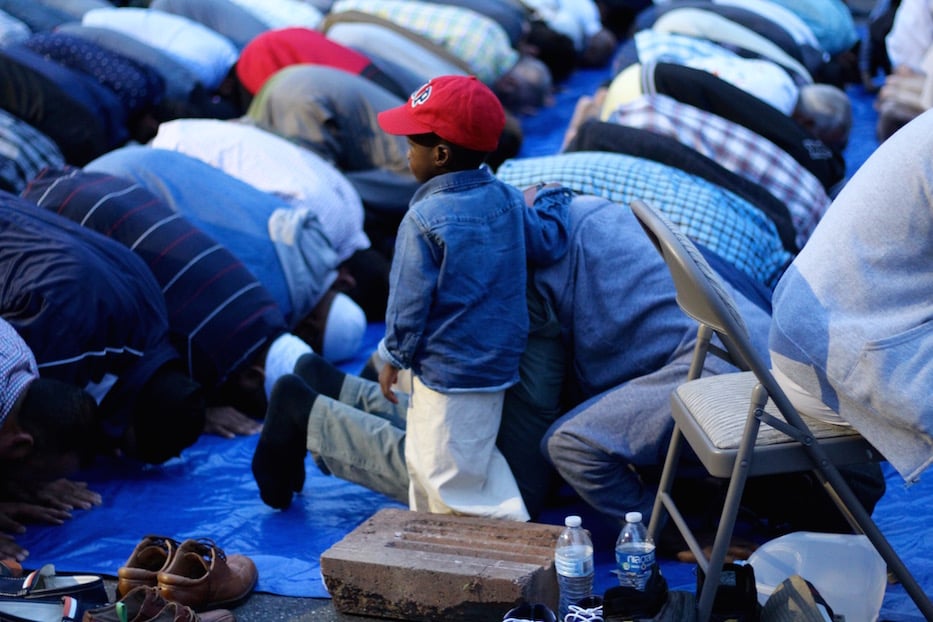
A few onlookers gathered on the side of the building, holding bowls of dates and cups of warm lentil soup. On the tarp, eyes closed and reopened; backs bent and straightened with reverence.
As the last note echoed over the lot, hundreds headed for trays of warm food, where chicken, vegetable-studded rice, salad, and pizza awaited. Some wore long white and tan kaftans, kufis and taqiyahs; others came in short-sleeve shirts and sweatpants. Syed, bouncing between old friends and new, urged attendees to eat, lifting his arms exuberantly with the words. Soon, hundreds of chairs and tables were filled with buzzing conversation as attendees, Muslim and not, broke their fast together.
Walking through the crowd, 10-year-old Sara Ashraf said that she was excited to see non-Muslim community members come out for the event, to both learn about Islam and show their support for the Muslim community.
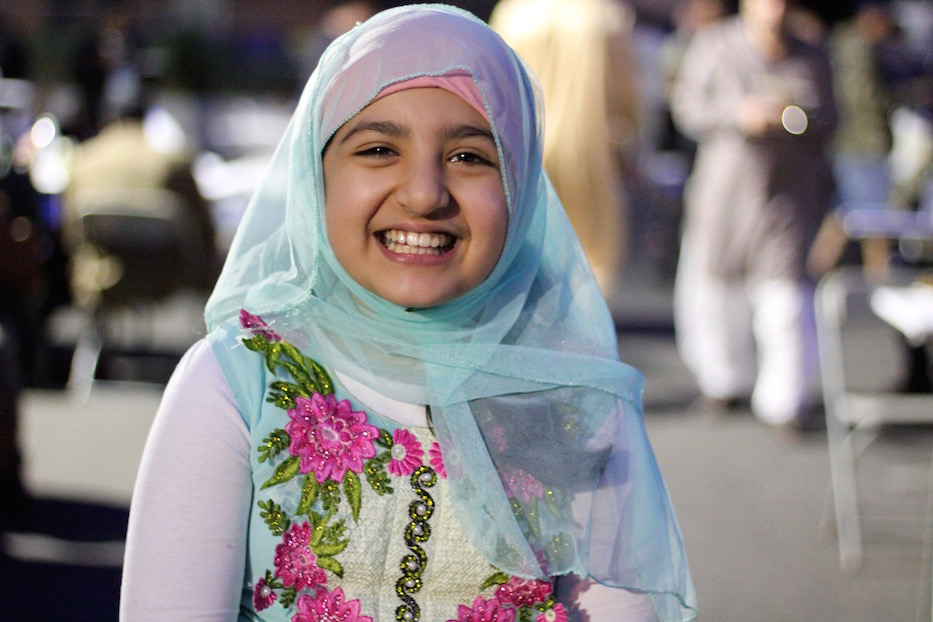
| Sara Ashraf: A gesture of support. |
As a young Muslim—her family attends both the United Muslim Masjid and Waterbury Islamic Cultural Center, where her dad is a board member—she said she's still figuring what Ramadan means to her, as both “a time to worship” and look inward.
Sitting nearby, her dad Jawad Ashraf said he was also excited to see the outpouring of interest in and support for the event, which has grown in attendance since last year. A graduate of Hartford Seminary, he noted the importance of interfaith community gatherings, where those who may not know about Islam can feel empowered to learn and ask questions in a welcoming setting.
“They can humanize Muslims instead of what they see on T.V.,” he said. “It’s a way to spread our good image. We know that the majority of images, myths and stereotypes are dispelled by people-to-people connections.”

